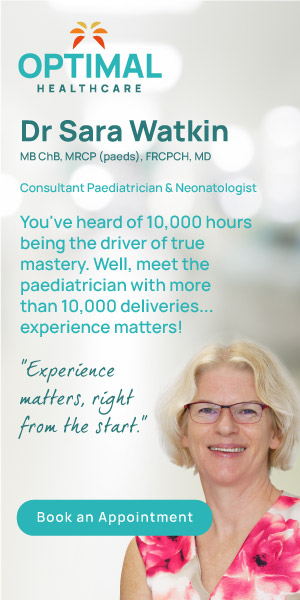August marks Children’s Eye Health and Safety Month. To mark the end of this important awareness month, we have written this article to provide some more information on what to expect at your baby’s first few eye exams and the importance of getting your baby’s vision routinely checked from infancy into childhood, adolescence and so on.
Eye Exams During Infancy: How Often Should My Baby Have One?
As parents, we instinctively prioritize our baby’s health and well-being. Infant eye examinations, a critical yet often overlooked component of early healthcare, are pivotal in setting the stage for a lifetime of healthy vision.
Newborns will receive essential eye evaluations as part of routine pediatric checkups. Neonatologist and Paediatrician here in the Cayman Islands Dr Sara Watkin, mentions in her breakdown of what to expect at your newborn’s first checkup, that she will examine your newborn’s eye appearance and movement, explicitly searching for conditions such as cataracts—where the lens inside the eye becomes cloudy—and other potential issues. This assessment isn’t meant to evaluate your baby’s visual acuity; it’s a method to detect any complications or specific conditions.
Babies should have several more routine eye checks during infancy then every few years during childhood and adolescence. In the Cayman Islands, it is usually recommended that after the initial newborn checkup, you take you baby for eye exams at: “…six weeks old, three years old, six years old, and then every two years after that. Their eye health and development will be tested each time, and their doctor will be able to flag any potential issues.” (Source: Cayman Parent)
What to Expect During an Infant Eye Exam:
- Visual Responses: Although babies can’t read eye charts, professionals use specialized techniques to assess visual acuity and responsiveness to light and stimuli.
- Eye Alignment: Eye care experts will check for proper alignment, identifying signs of strabismus (crossed eyes) or other alignment issues.
- Pupil Reactions: Pupil responses provide insights into the optic nerve’s health and the visual system’s overall function.
- Eye Health: The examination includes a thorough eye health evaluation, looking for signs of infections, congenital anomalies, or other potential concerns.
The Benefits of Routine Infant Eye Exams:
Ensuring you’re taking your baby to eye exams at the recommended age can be very beneficial in terms of allowing:
- Preventive Intervention: Early identification of vision issues allows for timely interventions. Conditions like amblyopia (lazy eye) can be treated more effectively during infancy.
- Healthy Visual Development: Detecting and addressing problems early on supports the development of solid visual pathways, ensuring better visual acuity and depth perception.
- Enhanced Learning: Clear vision is crucial for a child’s cognitive development. Addressing vision problems early can contribute to improved learning experiences.
Preparing for Success:
- Choosing Your Baby’s Optician: ‘Where do I start?’ Taking time to research opticians on the island, seeing who is nearest to you and calling to ask any questions ahead of time can help you feel more at ease and know what to expect. Additionally there are various guides available such as this one, which recommend some opticians in the Cayman Islands.
- Comfort is Key: Schedule the exam when your baby is well-rested and calm to ensure the most accurate results.
- Ongoing Observation: While professional exams are vital, parents should continue observing their baby’s eye behaviors for signs of discomfort, excessive tearing, or unusual movements.
In conclusion, ensuring your baby has their routine eye examinations during infancy is a proactive investment in their future visual health. Parents can set their children on a path to a clear and healthy vision by identifying and addressing potential concerns during the early stages. Remember, your baby’s vision is a precious gift—nurture it from day one for a lifetime of sight and exploration.


